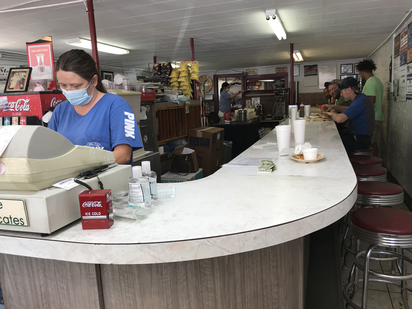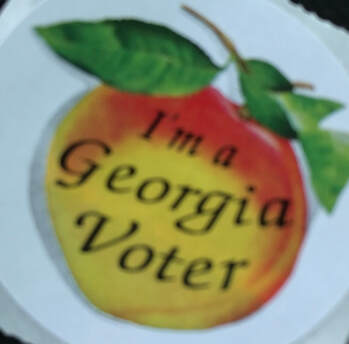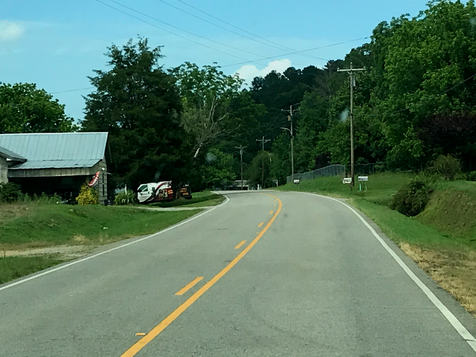 A scene from flyover country A scene from flyover country Sam Burnham, Curator I was watching the latest episode of TrueSouth the other night. I’ve gone back to that episode a few times to revisit a scene that has stuck with me. I’ve thought long on it. I’ve pondered it. Something needs to be said. John T. Edge was sitting at a table with Martha Goodard, owner of the 14th Street Grill in Phenix City, Alabama. She was reluctant to talk. He made the comment that “She feared we were there to pry, maybe even poke fun. But we weren’t.” That’s where the beauty of the show really stood out. John T has a gift. He can walk into a small town dive and connect with the people there. He can win their trust, not by trickery but by sincerity. That’s how he told half the story of that episode. You can’t really blame Martha Goodard. She’s running a hot dog joint in a town still known for its wild past. Even I’ve heard a first hand account of “Sin City” in its heyday. So when a bunch of strangers roll into town with cameras asking questions she, understandably, suspected evil intent. When she finally opened up, she told a story that’s all too familiar with Southerners her age. She spent years working on her daddy’s farm as well as in the cotton mill. Her hands know what work feels like. She has a grit that comes from such a life. But it’s that grit that has kept her restaurant going through the pandemic. It’s honorable. It’s dignified. But this is also a way of life that is frequently maligned in certain segments of the media. There are camera wielding crews that would turn Ms. Goodard and her restaurant into a punchline for a laugh or perhaps to prove some political point. If you’ve lived in The South long enough you’ve seen it. Perhaps you’ve even been the target. This is one of those phenomena that hits places like Atlanta’s West End and the town of West Point quite equally. It’s true in Phenix City or the big city. Poor urban blacks and poor rural whites both know marginalization. They both know exploitation. Their experiences are what fuel their distrust of media. Their experiences are what put them on the defensive. Understanding how someone votes, how they relate to the rest of the world, how they choose to open up or shut down, all depends on understanding exploitation and marginalization. It all comes down to trust and that is earned. When a corporation or a politician exploit someone it is usually private. The anguish is around the dinner table, making a family budget, or losing sleep over making ends meet. When someone with a camera or perhaps a column in The New Yorker exploits someone, it’s very public. It’s humiliating and it drives stereotypes and creates more exploitation. That’s precisely what makes what John T did so powerful. He took the time and connected with Martha Goodard. He used his camera to show her humanity. Instead of some linthead turned hot dog maker, she was more accurately cast as a hardworking entrepreneur who is running a business while caring about the well-being of her employees and meeting the needs of her customers. On TrueSouth she didn’t become a punchline. She became a hero. That is the power of media. It can be wielded to show the world the truth about The South. It can be used to tell the stories of the marginalized, the abused, the ridiculed. It has the power to celebrate and honor just as much as it can humiliate or exploit. There is a lot of talk of unity and healing in the various outlets of the media of late. There are a few ways that this could go. I want to look at two. The first is the now defunct Jeep Super Bowl ad. Bruce Springsteen (who is temporarily 'problematic' at the moment) extolling the virtues of "the middle" and all the ways that we can come together in some sort of peaceful and harmonious ideal. In this scenario we get a cinematic utopia of the rural landscape of the American Heartland. The little chapel, the flying flag, the passing train, and The Boss riding in his Jeep pull at our heartstrings. It is a beautifully made ad. But it is just that. It is just an ad. It puts a pleasant thought in our minds and maybe even makes us want to reach for unity. But Bruce isn't really one to lecture us on unity and meeting in the middle. On the other hand, I know some of John T's beliefs on politics and culture. There are things I know he and I disagree on. I can promise you there are things he and Martha Goodard disagree on. Yet there he sat at a table in her restaurant patiently connecting with her and telling he story to his audience. He portrays her as a responsible employer who cares for her employees and her customers. He tells us that her life and her experiences are important, that they matter to the culture of The South. He went out of his way to make this connection, to earn her trust. He did not have to do this. He could have ridden around Phenix City in a Jeep and gave stirring narration. But he got out of the car. He met Martha Goodard where she was. He didn't just pontificate about unity. He actually practiced it. In the process he made a beautiful story and he made the world a little bit better. That is how we will find unity.
0 Comments
 Sam Burnham, Curator So I had this dream the other night. I’m not sure which part is the weirdest but I think I found a message in it. Let me tell the story, don’t try to get too partisan in the analysis until we get to the message part. Just enjoy the weird story. I’m sitting in an airport terminal. I’m pretty sure it was in Atlanta but I’m not sure. It was far nicer than Philadelphia but not as cool as Denver. It could have been anywhere else, I guess. Let’s just say Atlanta. Don’t get distracted. Anyway, I’m sitting there with one of my sons. I’m not sure why it was just the two of us waiting to board a plane for Hawaii. There’s really no reason for the two of us to be going to Hawaii without any other family members. Hey, you’re getting distracted again. Pay attention here because it’s about to get weirder. So I’m looking out the window at the vacant jetway waiting for the plane to arrive. Of all people, Barrack Obama walks up and sits down next to me. We just start talking. No introductions, no greetings. We’ve known each other for years, so it seems. In reality I don’t know him from Adam and he sure doesn’t know me. We agree on almost nothing politically but he’s a cool enough guy and were just shooting the breeze. We’re talking about simple stuff, regular people conversation stuff, common ground stuff. Don’t get distracted by specifics. Then it hits me. My old pal Barry here grew up in Hawaii. It’s like home to him. He’s not going to Hawaii. He’s just sitting here hanging out with my son and I while we wait on our plane. He’s got nothing better to do and his Secret Service detail can get him through the TSA checkpoint. So I ask if he wants me to bring him something back. Yes, I know he’s got a lot more money than me and if he wants something from Hawaii he can jump on a plane and go get it. That’s not the point. I’m going. He ain’t. If he wants a fresh pineapple or one of those dancing hula girls that you sit on your dashboard, I’ll bring him one. The dream trailed off as he chuckled humbly the way you do when you’re declining an offer to bring back a gift that you really want. I’ll find him something. It’ll be nice but it won’t be Hula Bowl tickets. Maybe a tiki head penny bank. Anyway, that’s the story. So here’s the message. The outcome of this election is political. Our everyday lives shouldn’t be. If we can’t carry on conversations and even friendships with people we disagree with politically, then we need to take some emotional and intellectual inventory. We need to think about the weight we put on things. Politics should absolutely divide us ideologically. Politics should never divide us personally. If I can bring Barrack Obama back an ashtray shaped like Diamond Head, you can be civil to folks across the aisle from you. Take the election outcomes for what they are. Live your life regardless of them. It’s ok to be a decent human if your candidate loses. This is my 7th presidential election. The candidate I voted for has won twice so far. I have yet to resort to violence over it. It’s not the end of the world. We don’t have to become savages. We can watch Magnum P.I. Reruns and pretend we’re in Hawaii souvenir shopping. We can talk to old friends. We can make new friends. They can disagree with us. We can disagree with them. Good luck. Oh, and Aloha, y’all.  Sam Burnham, Curator In my previous article I mentioned the 1859 speech that Augustus Wright gave on the floor of the US House of Representatives. His idea, if taken only in summary, comes across as radical, leftist, perhaps even communist. But just as news headlines today don’t explain the details that are unearthed while actually reading the story, a summary of this speech cannot relay the brilliance of his idea. His speech opens with the observation that the federal government owned “a thousand million acres” (a billion acres) of land. Presently that number is around 640 million acres. That sounds like there has been a huge sell off but keep in mind entire states have been carved out of that 1859 estimate. The current total puts roughly 28% of all US land under the ownership of the federal government. Add land owned by state and local governments and that’s a sizable chunk of land that is in the public trust. He progresses into the idea he is presenting by laying out the importance of land ownership, not by the government and not by large planters but by the people at large. He advocated selling off, perhaps even ceding, arable tracts of public land to common people with the stipulation that they use the land to make their living. He described the power that self determination and independence can give to people. A man who owns his own land and can grow his own food has power. If he grows food for others he has income. This is the original American Dream. Wright further explains his position by pointing out the benefits for the government and the nation at large. He speaks of the economic benefits of having large swaths of the population become independent and prosperous. He explains that land ownership by those who want to work it benefits everyone. He describes his lack of sympathy for the rich who don’t need it “capital never fails to take care of itself.” He has similar feelings about willful vagrancy, “if a man will not work, neither shall he eat.” Then he explains that his sympathies lie with those who work and those who would work if they could. He asked his colleagues to consider the number of people who tilled the soil for others “obtaining a bare subsistence for themselves.”  This concept brings us back to the Oglethorpe model, to unleash the power of small landowners and empower them to defend themselves against exploitation. He further argued that this would build a nation of true citizens. No threat to the United States could overcome such a mass of citizenry who had a vested interest in this country. He argued that men would fight to defend their property and livelihood far more readily than they would for an abstract idea. Today the public holdings are fewer but still vast. Granted much of the land is in use as military bases, national parks, utilities, etc, but much of it just sits there. But there is also a new detail: corporate ownership. Big business has long been an issue but recently that threat has increased. If we only consider the Mississippi Delta, hedge funds own hundreds of thousands of acres. Large cotton plantations are owned by Wall Street investors who have likely never seen them. The people who live in the Delta, once described as “The Most Southern Place on Earth,” work the land to make rent payments to TIAA, Hancock, or UBS. There can be no self determination in such situations. This region has the largest per capita population of African Americans in the country. Much of this land was once owned by their ancestors and the way they lost it wasn’t pretty. So we see those two heads of the same monster- big government and big business - tightly grasping large landholdings that could otherwise be providing opportunity to a truly empowered working class - motivated, diverse, independent, hopeful.  Wright’s sentiment on this situation? “Any contrivance of men, by governments or corporations, whereby those who would labor are prevented from laboring, is, to that extent, a mischievous contrivance.” Regardless of the economic benefits of the current situation, it amounts only to damage in comparison to a model that unleashes the productivity of citizens achieving independence. Wright’s plan lays out an agricultural solution. In 1859, particularly in the South, agriculture was the reality. Atlanta was a dusty crossroads on a rail line. Birmingham, Orlando, and Miami didn’t exist. Commerce and industry were almost nonexistent across the South. In 2020 we can make adjustments to the plan. This is where we look at the percentages of the market controlled by Walmart, Wells Fargo, Home Depot, and other household names. The ability for local banks, local grocery stores, and local mercantile businesses to gain a foothold in the market is hindered by policies made by governments and choices made by customers. In this model, wages, benefit packages, leave policies, and other human resource practices are developed by people who never meet the employees they manage. Employees become a number rather than a person and humanity is lost in the shuffle. Small businesses have a better chance of preserving humanity and also offer independence to more people than huge corporations. More people running smaller businesses build a larger economic base than fewer people running large businesses. So we see, once again, an old idea that is wiser than current practices. Wright’s spin on Oglethorpe’s model is an option we can update easily and put into practice. |
Sam B.Historian, self-proclaimed gentleman, agrarian-at-heart, & curator extraordinaire Social MediaCategories
All
Archives
November 2022
|




 RSS Feed
RSS Feed
